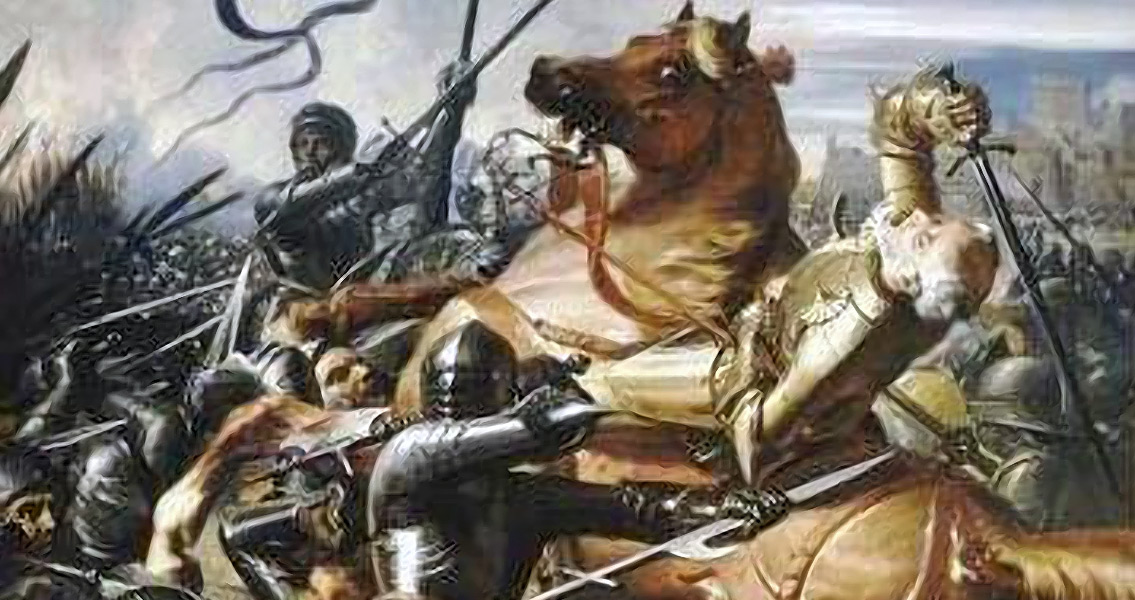<![CDATA[On 17th July, 1453, the Battle of Castillon brought the Hundred Years' War to a close. With their defeat at the Battle of Castillon, the English lost their last territories in France: Guyenne and Gascony. French forces had captured Guyenne and Gascony two years previously, in 1451. After years of English rule, the French regime was alien to the inhabitants, who in October 1452 welcomed the arrival of an English army led by John Talbot, the Earl of Shrewsbury. The following summer, the French forces regrouped and prepared to recapture the region. Crucially, they were bolstered by the artillery of Jean Bureau, a commander who would later be regarded as instrumental in developing France's military dominance Castillon, a stronghold of pro-English sentiment on the Dordogne River, was selected as the target for the first attack. French forces amassed in a camp outside Castillon and commenced their siege. The Earl of Shrewsbury seems to have miscalculated just how heavily the camp had been fortified, and under the mistaken belief that the French were preparing to retreat advanced with just 1000 of his horsemen to attack them. The English cavalry came under bombardment from the French cannon, and quickly suffered heavy losses. By the time the 5,000 English infantry who were advancing in the wake of the cavalry started to arrive, the course of the battle was already clear, the Earl of Shrewsbury was killed and the English troops routed by the French. The next day, the remainder of the English garrison stationed in Castillon surrendered. Although Bordeaux remained a stronghold of English support until its capitulation in October 1453, the catastrophic (for the English) Battle of Castillon was the last military engagement of the Hundred Years' War. Historians traditionally date the Hundred Years' War from 1337 to 1453, although skirmishes and periods of intermittent conflict before and after those dates mean they are far from agreed upon, especially because of the generally fragmented, stop start nature of the conflict. The causes of the war basically related to disputes over the overseas territories of the English kings. Since William the Conqueror, the duke of Normandy, had become king of England in 1066, a situation developed where subsequent kings of England were also the owners of significant territories in France. This situation inevitably upset the balance of power in western Europe. The English kings were vassals to the king of France through the territories they held in his kingdom. However, their position in England meant they wielded much more power than the other French vassals. Conflicts broke out as English kings sought to make their territories in France independent from the influence of the French king, with the duchy of Guyenne being a particular centre of dispute in the late thirteenth and early fourteenth century. The Hundred Years War started when the English king Edward III laid a claim to the French crown itself. The French King Charles IV had died in 1328 with no male heir. Edward held a claim to the throne through his mother, Charles' sister, but was passed over in favour of Philip VI. French support of Scotland in several confrontations with England, combined with the desire to pull the French duchies away from Philip's influence, saw Edward reassert his claim to the French throne. Philip's claim to the throne allowed him to win the support of discontented French princes and provinces, making it close to impossible for the French king to govern his northern territories from Paris. This instability would remain throughout the fourteenth and fifteenth centuries, and ultimately fueled what became known as the Hundred Years' War. ]]>
Battle of Castillon Ends Hundred Years' War
